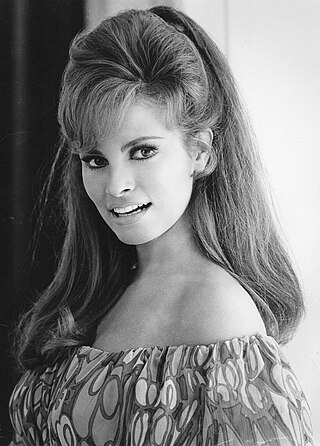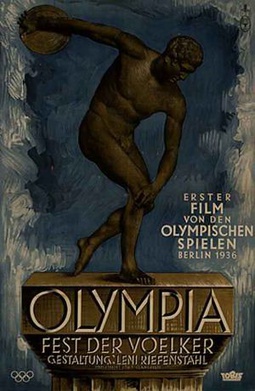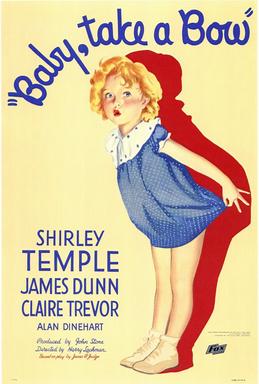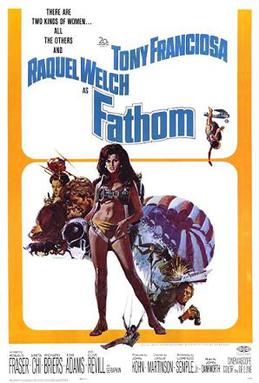Related Research Articles

Triumph of the Will is a 1935 German Nazi propaganda film directed, produced, edited and co-written by Leni Riefenstahl. Adolf Hitler commissioned the film and served as an unofficial executive producer; his name appears in the opening titles. It chronicles the 1934 Nazi Party Congress in Nuremberg, which was attended by more than 700,000 Nazi supporters. The film contains excerpts of speeches given by Nazi leaders at the Congress, including Hitler, Rudolf Hess and Julius Streicher, interspersed with footage of massed Sturmabteilung (SA) and Schutzstaffel (SS) troops and public reaction. Its overriding theme is the return of Germany as a great power with Hitler as its leader. The film was produced after the Night of the Long Knives, and many formerly prominent SA members are absent.

Jo Raquel Welch was an American actress. Welch first gained attention for her role in Fantastic Voyage (1966), after which she signed a long-term contract with 20th Century Fox. They lent her contract to the British studio Hammer Film Productions, for whom she made One Million Years B.C. (1966). Although Welch had only three lines of dialogue in the film, images of her in the doe-skin bikini became bestselling posters that turned her into an international sex symbol. She later starred in Bedazzled (1967), Bandolero! (1968), 100 Rifles (1969), Myra Breckinridge (1970), Hannie Caulder (1971), Kansas City Bomber (1972), The Last of Sheila (1973), The Three Musketeers (1973), The Wild Party (1975), and Mother, Jugs & Speed (1976). She made several television variety specials.

Olympia is a 1938 German documentary film written, directed and produced by Leni Riefenstahl, which documented the 1936 Summer Olympics, held in the Olympic Stadium in Berlin during the Nazi period. The film was released in two parts: Olympia 1. Teil — Fest der Völker and Olympia 2. Teil — Fest der Schönheit. The 1936 Summer Olympics torch relay, as devised for the Games by the secretary general of the Organizing Committee, Dr. Carl Diem, is shown in the film.

Brigitte Horney was a German theatre and film actress. Best remembered was her role as Empress Katherine the Great in the 1943 version of the UFA film version of Baron Münchhausen, directed by Josef von Báky, with Hans Albers in the title role.

Nazism made extensive use of the cinema throughout its history. Though it was a relatively new technology, the Nazi Party established a film department soon after it rose to power in Germany. Both Adolf Hitler and his propaganda minister, Joseph Goebbels, used the many Nazi films to promote the party ideology and show their influence in the burgeoning art form, which was an object of personal fascination for Hitler. The Nazis valued film as a propaganda instrument of enormous power, courting the masses by means of slogans that were aimed directly at the instincts and emotions of the people. The Department of Film also used the economic power of German moviegoers to influence the international film market. This resulted in almost all Hollywood producers censoring films critical of Nazism during the 1930s, as well as showing news shorts produced by the Nazis in American theaters.

Louise Lovely was an Australian film actress of Swiss-Italian descent. She is credited by film historians as being the first Australian actress to have a successful career in Hollywood, signing a contract with Universal Pictures in the United States in 1914. Lovely appeared in 50 American films and ten Australian films before retiring from acting in 1925.

S.A.-Mann Brand is a German film made around the time that Adolf Hitler became Chancellor of Germany. It was released in mid-June 1933.

Niles Eugene Welch was an American performer on Broadway, and a leading man in a number of silent and early talking motion pictures from the early 1910s through the 1930s.
Louis Jacques Marie Collin du Bocage, better known by the pen name Louis Verneuil, was a French playwright, screenwriter, and actor.

Baby Take a Bow is a 1934 American comedy-drama film directed by Harry Lachman and is one of the earliest Hays code Hollywood films. The screenplay by Philip Klein and Edward E. Paramore Jr. is based on the 1926 play Square Crooks by James P. Judge. Shirley Temple plays the child of an ex-convict trying to make a better life for himself and his family. The film was a commercial success and is critically regarded as pleasant and sentimental. A musical number features Dunn and Temple.

Fathom is a 1967 British spy comedy film directed by Leslie H. Martinson, starring Raquel Welch and Anthony Franciosa.

Over the Moon is a 1939 British Technicolor comedy film directed by Thornton Freeland and starring Merle Oberon, Rex Harrison, Ursula Jeans and Herbert Lomas.

The Riders of German East Africa is a 1934 German war film directed by Herbert Selpin and starring Sepp Rist, Ilse Stobrawa and Rudolf Klicks. It was shot at the Terra Studios in Berlin and on location at the sand dunes at Marienhöhe in the capital, a former quarry which stood in for Africa. The film's sets were designed by the art directors Robert A. Dietrich and Bruno Lutz. It was based on the novel Kwa Heri by Marie Luise Droop. Although produced as an anti-British propaganda film, it was later banned by the Nazi authorities after the outbreak of the Second World War for not being hostile enough to Britain. In the post-war era the film was also banned by the Allies for its promotion of militarism.

Bismarck is a 1940 German historical film directed by Wolfgang Liebeneiner and starring Paul Hartmann, Friedrich Kayßler, and Lil Dagover.

The Ruler is a 1937 German drama film directed by Veit Harlan. It was adapted from the play of the same name by Gerhart Hauptmann. Erwin Leiser calls it a propagandistic demonstration of the Führerprinzip of Nazi Germany. The film's sets were designed by the art director Robert Herlth. Location shooting took place around Oberhausen and Pompeii near Naples. It premiered at the Ufa-Palast am Zoo in Berlin.
The Rothschilds is a 1940 Nazi German historical propaganda film directed by Erich Waschneck.

Hitlerjunge Quex,, is a 1933 German film directed by Hans Steinhoff, based on the similarly named 1932 novel Der Hitlerjunge Quex by Karl Aloys Schenzinger. It was released in the United States as Our Flag Leads Us Forward.
Friedrich Schiller – The Triumph of a Genius is a 1940 German film, based on the novel Passion by Norbert Jacques. The film focuses on the early career of the German poet Friedrich Schiller.

The Rebel is a 1932 German historical drama film directed by Curtis Bernhardt, Edwin H. Knopf, and Luis Trenker and starring Trenker, Luise Ullrich, and Victor Varconi. The film's art direction was by Fritz Maurischat. It was made by the German subsidiary of Universal Pictures, with location shooting in Austria and St. Moritz, and Zuoz, Switzerland. Interior scenes were filmed at the Tempelhof Studios. A separate English language version, The Rebel, was released the following year. The film is part of the mountain film genre.
Fred Andreas (1898–1975) was a German novelist, journalist and screenwriter. A number of films are based on novels of his including the 1934 production A Man Wants to Get to Germany.
References
- ↑ Welch 1983, p. 269.
- 1 2 Welch 1983, p. 273.
- ↑ Welch 1983, p. 219.